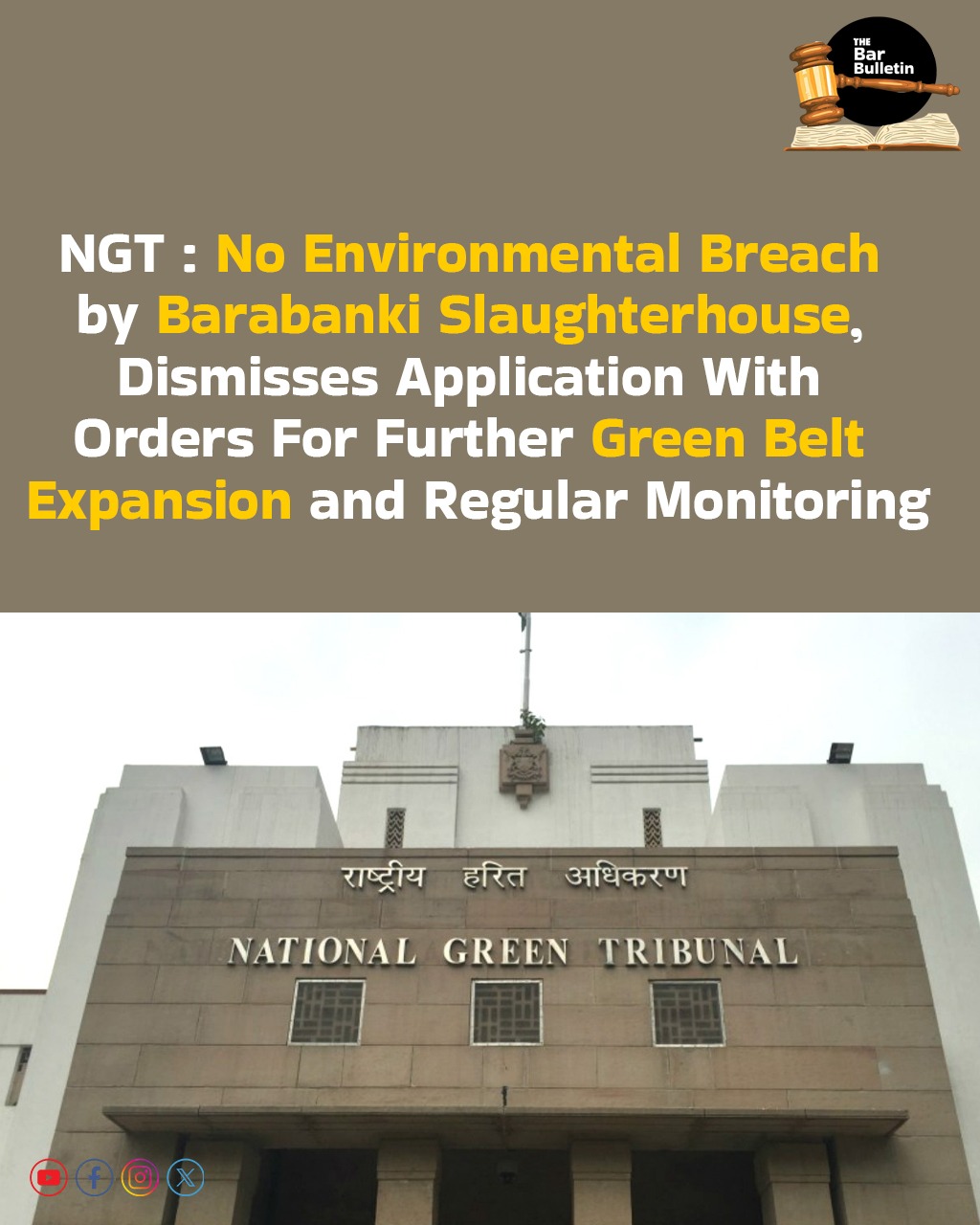The National Green Tribunal (Principal Bench, New Delhi) dismissed the application, finding no violation of environmental norms or consent conditions, but directed the slaughterhouse to further strengthen its green belt and continue compliance monitoring.
The applicant, Anupam Verma, District President of Bhartiya Kisan Union (Tikait), Barabanki, Uttar Pradesh, filed a letter petition raising grievances about alleged environmental violations by M/s Amroon Foods Private Limited (now M/s Fair Export India Pvt. Ltd.), a slaughterhouse in Barabanki district. The slaughterhouse is a large-scale operation processing 80 metric tons/day, with up to 750 buffaloes and 750 sheep/goats slaughtered daily.
The applicant, though not appearing in person, had alleged serious violations based on local reports. These allegations included untreated effluent discharge, dumping of animal remains in the Reth River, slaughter of stolen, young or pregnant animals, and child labour. He sought intervention for environmental protection, directions for compliance, and cessation of alleged illegalities.
The Tribunal constituted a Joint Committee of officials from the District Magistrate’s office, the UP Pollution Control Board (UPPCB), and APEDA to investigate the allegations. Multiple inspection reports were filed, including analyses of effluent, review of green belt development, and verification of compliance with various environmental and animal welfare regulations.
The slaughterhouse, supported by government agencies’ inspection data, argued that it complied fully with air, water, waste, and animal welfare regulations, had all consent orders in place, maintained a green belt covering nearly 40% of its premises, and utilized effluent treatment systems.
The Tribunal Bench comprising Justice Arun Kumar Tyagi (Judicial Member) and Dr. Afroz Ahmad (Expert Member) referenced government orders and past court rulings of the Supreme Court in Common Cause v. Union of India[1], and of the Allahabad High Courtin M/s Al Haq Food Pvt. Ltd. v. State of U.P.[2], which mandate comprehensive environmental and animal welfare controls for slaughterhouses.
The Tribunal found that the joint inspection reports, DFO verification, effluent analysis, and greenbelt assessment (including planting 24,332 trees of 61 species over 41,762.9 sq. meters, representing 39.88% of the land area) demonstrated substantial compliance. However, noting the persistence of foul odour from the rendering plant, the Tribunal directed enhanced plantation of specific aromatic and multipurpose tree species during the next monsoon, periodic monitoring by UPPCB, and timely improvements as needed.
In result, the NGT dismissed the applicant’s original application after confirming compliance with environmental, waste management, and animal welfare standards. The slaughterhouse was directed to expand its green belt, prioritizing species that reduce odour and improve ecological outcomes.
The UPPCB was directed to conduct periodic inspections and issue necessary directions to ensure continued compliance. No adverse orders were passed against the project proponent, and all parties were instructed to implement the recommended improvements and maintain documentary evidence of future compliance.
Counsel for respondent no. 1-State of U.P.: Ms. Priyanka Swami, Adv.
Counsel for respondent no. 2-UPPCB: Ms. Sthavi Asthana, Adv.
Counsel for respondent no. 3-APEDA: Ms. Vidushi Tripathi, Adv. (through VC)
Counsel for respondent no. 4-M/s. Fair Export India Pvt. Ltd.: Mr. Sanjeev Ralli, Senior Adv. and Mr. Yash Sharma, Adv.
[1] W.P No. 330 of 2001, order dated 27 February 2017
[2] Writ-C No. 4368 of 2022, judgment dated 31 May 2023



